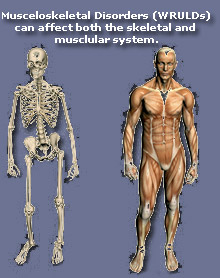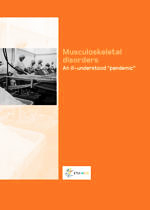 |
 |
|
MSDs: Euro Commission Buries Head In Sand Until At Least 2020 The scale of work-induced musculoskeletal disorders (MSDs) has been clear for over twenty years. They top the tables of national statistics on recognized occupational diseases. Their prevalence in the population is a function of working conditions and risk factors that demand a policy of prevention. The record of preventive actions in most EU countries, however, is very poor. Three of the four main disease groups in the Dublin Foundation's European Working Conditions Survey are MSD-related. Backache is suffered by 47% of female and 46% of male workers; neck ache and upper limb pain affect 45% of women and 41% of men workers; while lower limb pain is experienced by 30% of women and men alike. In the UK, recent surveys show that MSDs come second to Stress in the workplace, although in previous years, MSD's topped the list of work related health conditions that millions of workers suffer each year.
The effects of MSDS build up over and beyond working life. They are a factor in forcing many workers out of their jobs, impair the quality of life of older people and can lead to an increased death rate from the long-term consequences of inflammatory diseases. Further with the attitude of Human Resource and Sick Absence Management Companies, not to mention those of the employers and Government in the UK, the speed at which workers suffering from MSDs (or Work Related Upper Limb Disorders as the have become classified as), is faster than in this country. Attacks on worker's rights and their health and safety protection at work; will serve only to speed up that process. Most EU Member States have no specific legislation to guide preventive action against MSDs. There are two reasons why: the lack of an EU directive, which leaves most states sitting on their hands, and employers' opposition to anything that touches on work organization. Work accidents are unwelcome to employers since they harm both workers and production, whereas MSDS are seen as the inevitable sacrifice that workers have to make of their bodies in the cause of productivity. The fact that work accidents mostly affect men and MSDS mostly women is also a factor in putting down MSDs to The Community legal framework addresses only a small number of factors like vibration, screen work and manual handling of loads that contribute to MSDs. A comprehensive strategy should include physical factors (like poorly designed
In May 2012, the Commission put forward yet another impact assessment for a possible MSD Directive to its Impact Assessment Board (IAB), an internal, supposedly purely advisory body. The assessment showed the benefits of legislating. The IAB's comments betrayed its ideological opposition to the principle of social directives. Instead of addressing these comments in a full report, the Directorate General for Employment and Social Affairs decided to back down and settle for a recommendation. Source: ETUI H&S at Work Magazine Spring/Summer 2013: HesaMag#07 /Unionsafety See the E-Library Database for information and reports on MSDs - select the category of 'Work Related Upper Limb Disorders'
|
 Musculoskeletal disorders (MSDs) are injuries and disorders of the musculoskeletal system and can affect the muscles, nerves, tendons, ligaments, joints, cartilage, and/or spinal discs that may be caused or aggravated by various hazards in the workplace.
Musculoskeletal disorders (MSDs) are injuries and disorders of the musculoskeletal system and can affect the muscles, nerves, tendons, ligaments, joints, cartilage, and/or spinal discs that may be caused or aggravated by various hazards in the workplace.